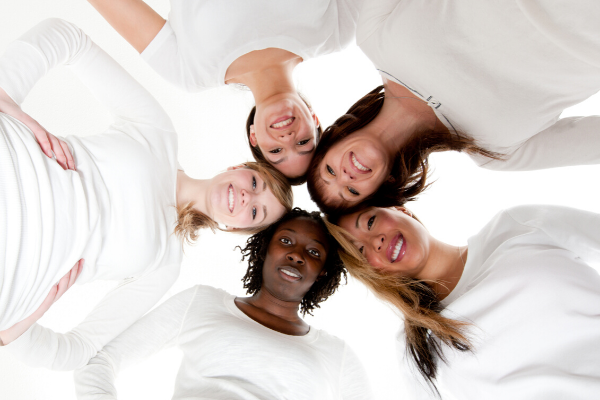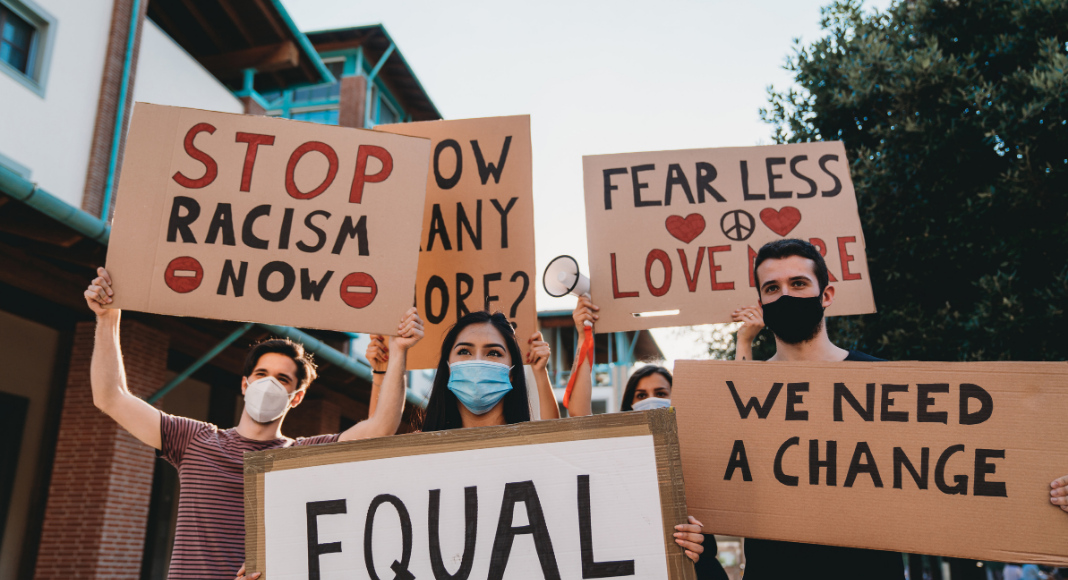People worldwide were shaken when the horrific murder of George Floyd was shared across social media and across TV networks. It has opened up a conversation that has been going on quietly and mostly behind the scenes for generations. And it has left a lot of White people asking, “What do I do now?” And while I cannot speak to everyone’s individual circumstances, my hope is to share with my waking White friends a few ideas and concepts that can help wherever you are on this lifelong journey towards being an ally.
Permission to Make Mistakes
A few weeks ago I was working upstairs and one of my sons was supposed to be working on his online piano lesson. He came to me and said, “I need your help, Mom.” But I wasn’t convinced this was an actual drop-everything-and-help kind of problem. I told him to watch the video again, but he assured me that wasn’t his problem. He basically said, “I know what I am supposed to do, I just can’t do it.” I smiled. I turned to him and said, “Son, if you know what to do, go do it. You are going to mess up lots of times before you get it right. But I give you full permission to go down to the piano and mess up and mess up until you get it right.”
He nodded and ran back downstairs and tried. Yes, he messed up. But then he tried again. And he tried again for the rest of his time at the piano that day. And the next day? He returned to the piano and tried again.
Sometimes I think we all need to remember that we don’t have to do everything {or anything, really} perfectly–especially not from the beginning. We just really want to. So, friend, as I share these ideas and concepts with you, my hope is that you remember this important truth: You are going to mess up. I am going to mess up. But that isn’t an excuse to stop trying or to not even begin to try to be an ally. We all have permission to mess up. We just have to keep trying. We have to keep trying until we get it right. And doing it “right” doesn’t necessarily mean “perfectly.” We need to acknowledge and apologize when we make mistakes and keep trying to improve. Making mistakes is uncomfortable and messy, but making them is a part of the process.
Ibram Kendi, author of the book How to Be an Anti-Racist, points out the importance of moving away from using the word racist as a word to describe a person and instead using it to describe ideas and actions. A person might make racist decisions and support racist ideas while simultaneously making other decisions and supporting other ideas that are anti-racist. The same person. They are not mutually exclusive. When we separate them from the person and identify the choices as racist or anti-racist, we provide opportunities for growth. We eliminate the need for the saying, “I don’t have a racist bone in my body.” As an ally, we acknowledge–like Timmy Failure–that Mistakes Were Made and then we can work to fix them.
Being an Ally Requires Lifelong Learning
Whether you are facing this new awareness for the first time, or you are a little further along on the ally journey, please know it is a journey. Yes, today you can do better than you did yesterday. But it can’t stop with today. No, you do not have to do big things every day, but you can’t stop. In her book White Fragility, Robin Diangelo writes, “We must be willing to consider that unless we have devoted intentional and ongoing study, our opinions are necessarily uninformed, even ignorant.” Not only does our ongoing study make us better allies, it helps us teach our children to be lifelong learners as well as anti-racists. They see how much effort we are putting in and they will internalize that message far more than any script we follow or books we buy them. We can’t avoid putting in the work if we sincerely wish to change.
We have such amazing resources here in our own backyard! Houston is the home to the Buffalo Soldiers National Museum. The museum is full of inspiring stories of Black heroes and history. Those heroes–that history–should be known and celebrated by all of us {Fun Fact:: the Buffalo Soldiers Museum contracts with local re-enactors who will do school presentations. You know, once this COVID-19 stuff has settled down}. The Harris County Public Library has The African American Library at the Gregory School and it is full of wonderful resources for children and adults.
Do you want an ally challenge that you can do right now? Open the calendar on your phone. Set an appointment with yourself for six months from now {bonus points if you set another appointment for one year from now}. You can call it “anti-racism check-in” if you can’t think of anything cooler to call it. In six months, check-in with yourself and see if you are still actively and intentionally learning more. If not, don’t beat yourself up. Just recommit. We’re moms and sometimes we get distracted by potty training and meal planning and home organization and pandemics and our kids’ homework assignments and sports schedules and wacky work schedules. But let that reminder help you recommit. Don’t abandon the ally journey just because of a distraction.
Be Kind–No Strings Attached
This is tricky, so I hope I explain it right. White friends, make eye contact with People of Color. Smile at a Black mom who passes by in the grocery store–even if she can’t see the smile right now through your mask. Say “hello” or “good morning” when appropriate. But don’t be offended if you don’t get a response. Our Black friends are not a charity case. They aren’t a group that needs our pity. Sometimes when a person of color sees a white person, the encounter may not bring up happy feelings. Or at the very least they feel less-than-inclined to trust a white person. They don’t owe it to us to respond. This exercise is for you, white friend. See people–not just people who look like you. See people with different colors of skin, people who may wear different head coverings than you, or people who speak different languages. See them. Don’t look away or try to look past them. See the person and not the stereotype. Acknowledge to yourself that they exist and they are all around you and they matter. Maybe you are rolling your eyes at me right now–that’s cool, it happens to me a lot. But try it. If you are being completely honest with yourself, you will recognize the validity of this exercise and it will feel more natural and less forced. If you start now, you’ll feel less awkward by the time masks come off!
Speak Up
Historically we have been too silent. But it is not too late to speak up now. If you are able, register to vote and vote your conscience. Even if you can’t vote, you can still sign petitions. Even a quick call or email to your child’s school can make a profound difference. Imagine what a question like, “What is our school planning for Black History Month this year?” can do for a school. If we are all silent, people assume we don’t care. But speaking up can nudge the consciences of those around us. I recently heard the statistic that 30 million people participated in “Black Out Tuesday” on social media. If 30 million voices continued to speak up for the rights of our Black neighbors, imagine the good that would come out of it. Imagine what PTOs could do to enhance Black History Month in schools {Remember the Buffalo Soldiers National Museum?}. Maybe you want to donate some diverse books to your local library or your child’s school library. Go for it!
But speaking up doesn’t always have to be on a large scale.
Maybe you want to consider buying more diverse books the next time you buy a birthday or baby shower gift.
Do you have a “friend” on social media who constantly posts hateful memes on social media? I have a few of those. Do you roll your eyes and scroll on? Or at most “react” with the angry emoji? Maybe next time you could send a DM and actually engage that “friend” in a conversation. I’m by no means an advocate of social media bashing, so I don’t recommend posting anything in the “friend’s” post comments or on their wall, but you do you, boo. The point is to speak up. Maybe said “friend” has never heard a different perspective. I mean maybe they’ve never heard it from anybody they know and/or possibly respect. Maybe they assume everybody feels the same way they do. Speak up. It will be uncomfortable, I promise. But it is important. Maybe you are planting seeds of truth that will be sown in the future. Speak up. Silence=complicence.
Don’t Let Guilt and Fear Stop You
The more we learn, the more difficult it all becomes. There is a lot of heaviness and a lot of weight involved in being an ally in the anti-racism journey. And if we let that weight sit on our hearts too long, we become stuck. We shrink back into our whiteness and we don’t dare venture out anymore. It hurts. It’s a natural reaction and it happens to the best of us. White shame is real. But we have to push through it. The Mom Psychologist has an excellent YouTube video entitled “How to Be a White Ally: How White Shame is Getting in the Way.” She shares two quotes that really help put things into perspective. The first comes from author Bell Hooks: “Privilege is not in and of itself bad; what matters is what we do with privilege. We have to share our resources and take direction about how to use our privilege in ways that empower those who lack it.” Don’t beat yourself up for having white privilege and never realizing it. Just do something good with it now that you know.
The second quote from The Mom Psychologist comes from Harry Brod:: “We need to be clear that there is no such thing as giving up one’s privilege to be ‘outside’ the system. One is always in the system. The only question is whether one is part of the system in a way that challenges or strengthens the status quo. Privilege is not something I take and which therefore have the option of not taking. It is something that society gives me, and unless I change the institutions which give it to me, they will continue to give it, and I will continue to have it, however noble and equalitarian my intentions” {Harry Brod, “Work Clothes and Leisure Suits: The Class Basis and Bias of the Men’s Movement,” in Men’s Lives, ed. Michael S. Kimmel and Michael Messner {New York: Macmillan, 1989}, 280}. You probably didn’t ask for white privilege the same way you ask for waffle fries at the drive-thru window, but you got it anyway. We can’t waste a lot of time feeling the weight of the privilege. The more we push, the more momentum we will build and the easier that heavy boulder will be to keep moving. The more we stop and back up and try to start again, the easier it is to either get exhausted or crushed.
And I need to put a little plug in for not letting anybody else guilt or shame you into believing you aren’t doing enough. They are in a different place than you are. If you are consistently learning and trying, keep at it. Don’t let someone else (whether good- or ill-intentioned) shame you into believing you aren’t doing the “right” things. I repeat:: if you are consistently learning and trying to be an ally, keep at it. Everybody’s anti-racism journey will look a little different for a myriad of reasons:: we come from different backgrounds with different families and different friends and different experiences–to name a few variables. This is not a place for judgment and shaming. We are working to create a better world for our children and our children’s children. Keep trying. Be honest with yourself and keep trying.
We’re going to make mistakes along this lifelong learning journey to be an ally. Let’s speak up and push through guilt and fear. Let’s have difficult conversations, being careful to avoid shaming and judgment. In the immortal words of the one and only Whitney Houston:: “Find your strength in love.”


















